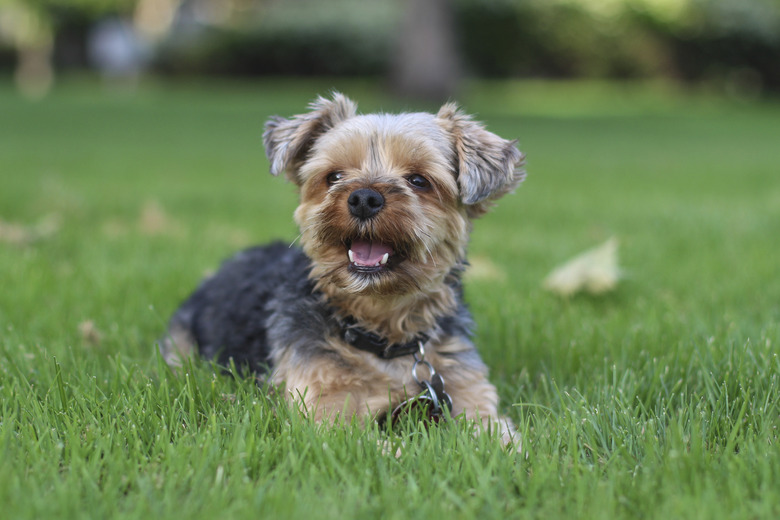Skin Disorders In Yorkies
Skin disorders in Yorkshire terriers generally result from allergies or diseases common in the breed. If you notice any bald spots, lesions, or Yorkie skin issues on your pet, take him to your vet. Examine his skin whenever you brush him and watch for your Yorkie itching and losing hair. If you take him to a groomer regularly, ask her to let you know if she sees any skin problems while washing or trimming your dog.
Yorkie skin problems and allergies
Yorkie skin problems and allergies
If your Yorkie is scratching, losing hair, and developing skin infections, it's possible he has an allergy. You and your vet must figure out what causing this allergic reaction, because most common canine allergies —flea, food, and inhalant — result in similar skin symptoms. If your pet isn't on a good monthly topical or oral flea preventive, that's a place to start.
If your vet suspects a food allergy, she'll put your Yorkie on a food elimination trial, in which he eats only one specific food protein for several months to see if symptoms resolve. He's then put back on his former food, to see if the reaction reappears. If it does, he goes back on the original elimination diet, probably for life. If the first elimination food doesn't work, you must start a trial with a new food, until you finally find one that your dog can eat.
Inhalant allergies are often seasonal, resulting from exposure to mold, grasses or pollen, or a combination of triggers. This type of allergy, also known as atopy, is often genetic in nature and requires minimizing exposure to the allergens, medication for symptom relief, and possibly a series of immunotherapy injections. The latter, over time, desensitizes your Yorkie to the allergen.
Hypothyroidism in Yorkies
Hypothyroidism in Yorkies
Lack of sufficient thyroid hormone, or hypothyroidism, is common in aging Yorkies. Because thyroid hormones affect many of a dog's systems, all sorts of symptoms appear. However, skin disorders are a primary sign, including hair loss, bacterial infections, dryness, and skin thickening. Other symptoms include weight gain, lethargy, and exercise intolerance.
Your normally active little Yorkie might no longer want to do much investigating or scampering on his outings. Diagnosis requires several blood tests to detect thyroid levels in the blood. If your pet is deemed hypothyroid, daily thyroid medication should put the spring back in his step and the hair back on his body.
Cushing's disease and Yorkie skin issues
Cushing's disease and Yorkie skin issues
Older Yorkies are prone to Cushing's disease, also known as hyperadrenocorticism. Cushing's disease occurs when the dog's adrenal glands overproduce the hormone cortisol, throwing off the entire body. Symptoms of Cushing's disease include thin skin, hair loss and changes in color, and chronic bacterial skin infections. Nonskin-related symptoms include excess drinking and urination, lethargy, and the development of a potbelly.
Your vet diagnoses Cushing's disease via blood tests, urinalysis, ultrasound, and X-rays. Treatment consists of daily medication, usually with L-Deprenyl, marketed under the brand name Anipryl. It can take a few months for Cushing's disease symptoms including Yorkie skin problems to resolve. Your vet also will prescribe antibiotics for any secondary skin infections.
Healthy Yorkie coats
Healthy Yorkie coats
If your Yorkie isn't suffering from a disease, keeping his coat healthy is relatively simple. Since skin and coat health start from the inside out, feed him a high-quality dog food and forgo table scraps. Ask your vet about giving your dog an essential fatty acid supplement, such as fish oil, to improve skin health.
Brush your Yorkie several times a week, and don't bathe him more often than necessary. Too much bathing can remove the skin's natural oils. Keep him on a flea and tick preventive when fleas are active in your region, as well as on heartworm medication prescribed by your vet.

